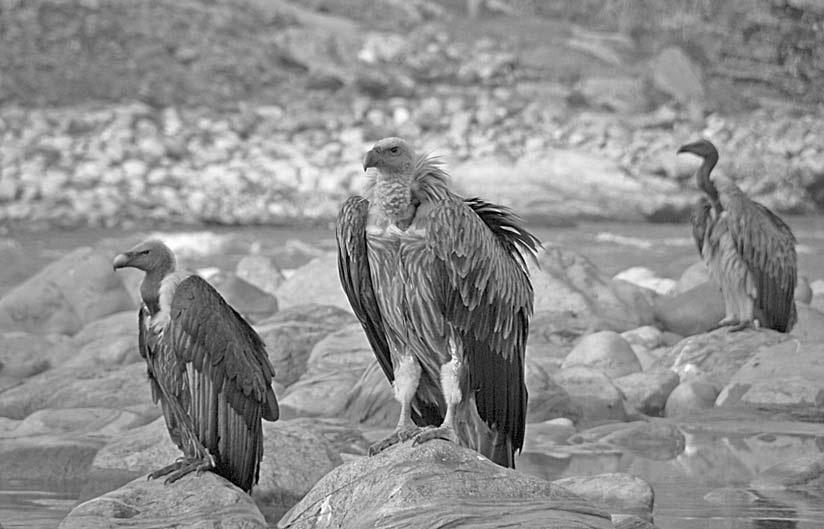Anand Chaudhary
This project aims to sustain two community managed vulture safe zones (safe feeding sites for vultures) and ensure that vultures receive safe food in the surrounding area.

Within South Asia vulture populations have undergone dramatic declines in excess of 97% for four species of vultures since the mid 1990s. In India, numbers of white-rumped vultures have declined by 99.9% from 1992 to 2007 (Prakash et al. 2007). Monitoring of vultures in Nepal indicates declines of a similar magnitude with a >90% decrease in numbers up to 2001 (Baral et al. 2004). As a consequence, four vulture species were listed by the World Conservation Union, as Critically Endangered and another species as Endangered (IUCN 2000, 2007). The cause of this collapse, at least for the Gyps vultures, has been identified as a veterinary drug 'diclofenac' (Oakes et al. 2004; Swarup et al. 2007).
To halt their decline, Bird Conservation Nepal helped establish a community managed vulture safe zone. The vulture safe zone has a cow rescue centre where old and unproductive cows are collected, provided good facilities until they die a natural death. Dead animals are then placed as food for vultures. This project was replicated in two other sites with support from Critical Ecosystem Partnership Fund. This project aims to sustain the two new sites and ensure that vultures remain safe in the surrounding area as well.
The project will have the following outputs:
- Infrastructure development: Capacity of a rescue centre will be expanded from 40 to 60 cattle so that vultures get a frequent food supply. A larger grazing area will be demarcated for cattle. Pre-existing information centres in two sites will be improved to hold more information and display materials targeting tourists and school children.
-Capacity building of community groups and research: Training on enhancing skill of community groups in managing restaurant and monitoring vultures will be held followed by training on monitoring veterinary institutions for diclofenac and awareness raising. Trained community groups will then carry out these activities. A socio-economic survey will be carried out at the beginning and end of project to measure its impact. Similarly, any one group of wildlife inside the Vulture Safe Zone will be surveyed and results displayed at the information centre.
- Sensitization and promotion: Relevant materials will be developed and sensitization activities carried out in schools and community. Government bodies, veterinary professionals, local community, tourism entrepreneurs and media will be engaged to stop use of diclofenac, to declare area surrounding the restaurant as Diclofenac Free Zone and to promote tourism to the area.